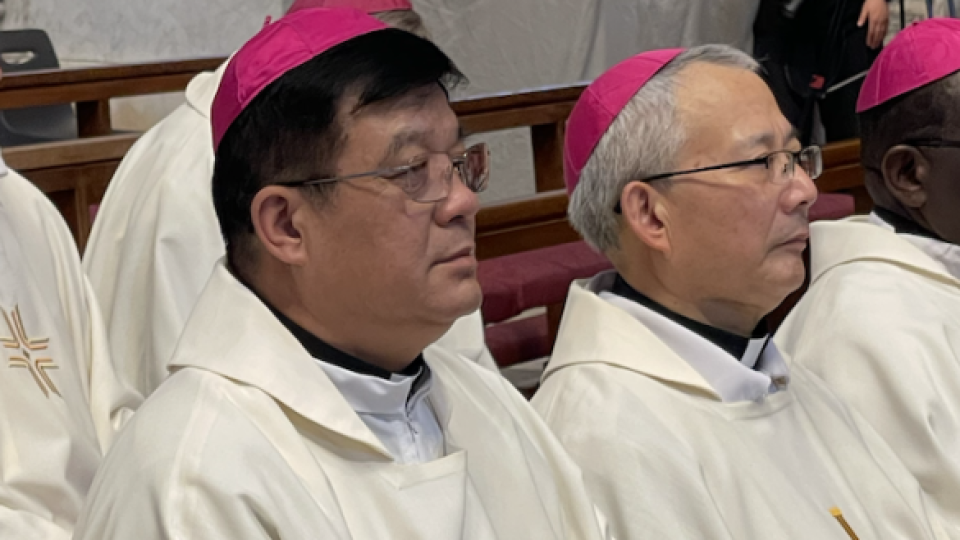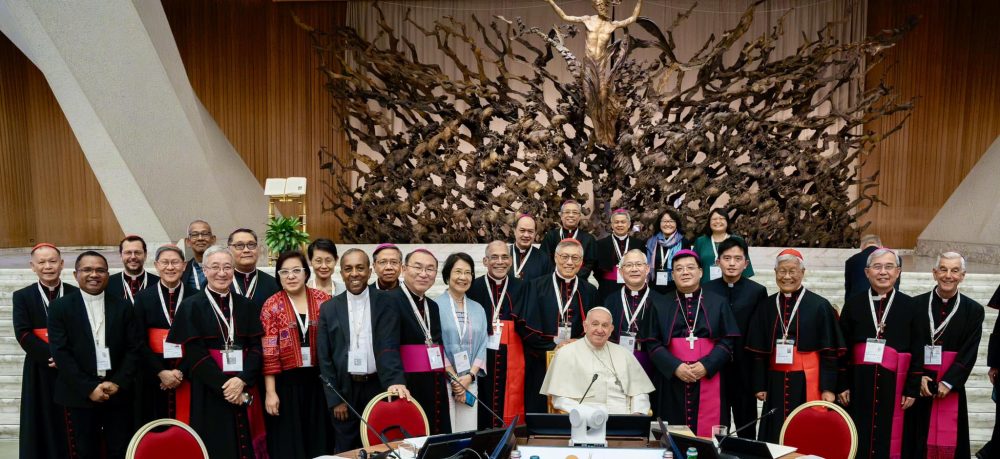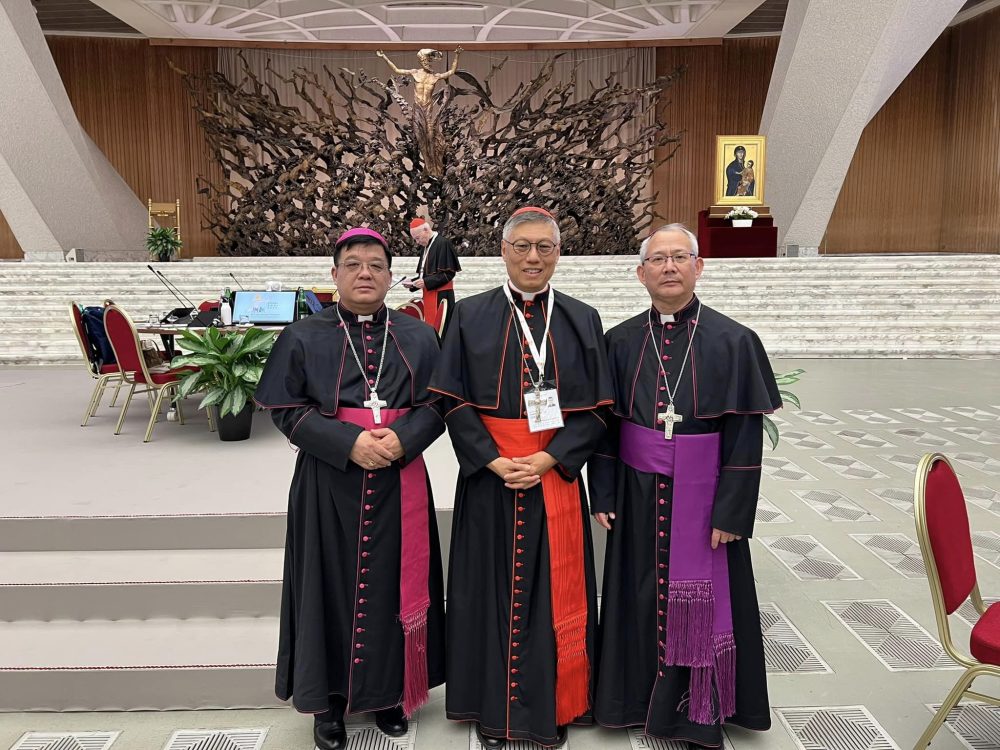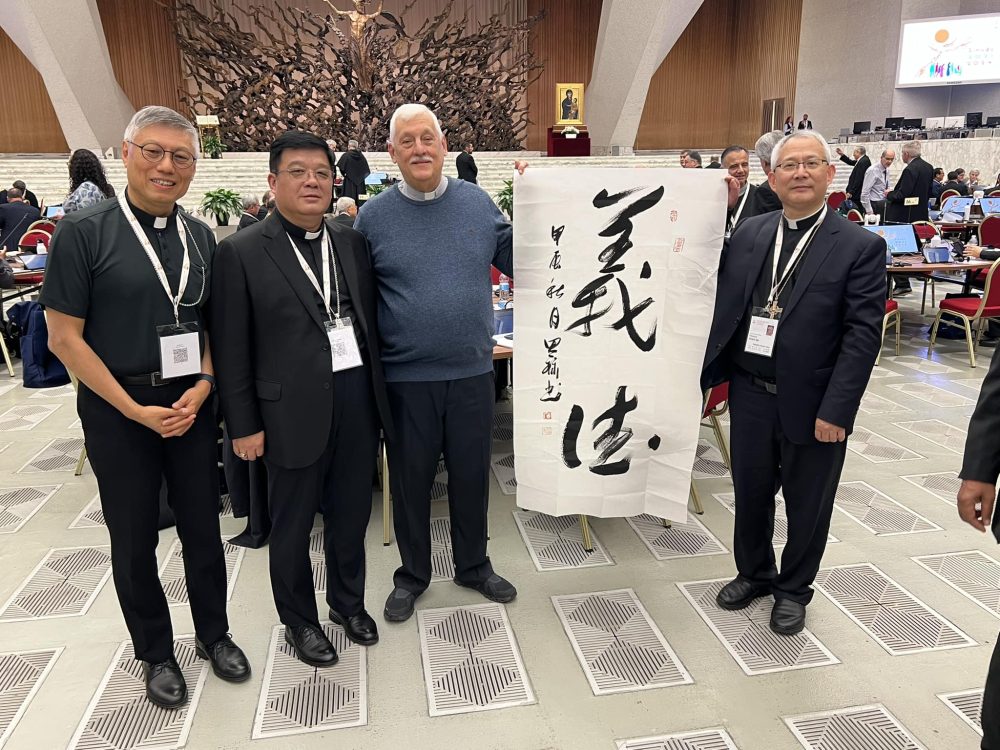
Photo courtesy of Salt + Light Media
「中國教會在信仰上和世界各國的天主教一樣,同屬一個信仰,同行一個洗禮,都忠於至一、至聖、至公、從宗徒傳下來的教會。」中國杭州的主教楊永強(若瑟)幾天前在世界主教代表會議上發言,講了這句話。他是來自中國大陸、出席在梵蒂岡召開會議的兩位主教之一,另一位是福建福寧/閩東的主教詹思祿(味增爵)。
此前,來自中國大陸的主教也有出席世界主教代表會議:分別是2018年以青年為題的世界主教代表會議,以及2023年關於共議同行(同道偕行)的世界主教代表會議第一期會議。在聖座與中國政府於2018年9月簽署臨時協議之前,沒有任何一位中國大陸的牧人能夠參加梵蒂岡第二屆大公會議和隨後的世界主教代表會議。
楊永強主教回顧了這幾次在與普世教會共融中的參與後,解釋說:
「我們遵循福音精神:『為一切人而成為一切人』的宗旨,積極適應社會,服務社會,堅持天主教中國化方向,廣傳福音。中國天主教本著平等友好,相互尊重的原則積極與世界各國的天主教會進行互訪。就教會牧靈福傳,社會服務,神學研討等方面進行交流,積極參加國際宗教和平會議和祈禱活動,為世界和平,促進人類命運共同體做光做鹽,推動各項事業的發展。」
主教最後表示:「歡迎各國天主教會和宗教團體到中國教會訪問」。
詹思祿主教的致詞更著重於基督信仰在中國的歷史。他提到耶穌會士利瑪竇的形象和他的「實驗」,即「基督福音在人類生活中不同的實踐形式」。不過,他接著補充說:
「然而,此後就如何分辨文化的差異性與基督信仰的純正性,一度使得在華傳教士感到困惑。這種困惑最終引發了一場著名的禮儀之爭。它的發生地正是我的教區閩東。『從歷史角度來看』,此次挫折原因之一便是教會忽略了人類文化的差異和互補性。成為福傳使命中的共議性教會就是在追尋人類終極目標——天主的旅途中尊重並聆聽來自不同歷史、文化和傳統的聲音。」
在中國教會必須以新的眼光面對的問題中,詹主教表示:
「如何面對因混合婚姻帶來家庭培育的挑戰;如何對地方相關法律法規的適應;如何解決教友在民間信仰與某些傳統文化之間的迷茫等都需要中國教會用新目光去審視。新時代的教會被賦予新的分辨任務,然而聖神的聲音總是隱微難辨的。因此謙卑地從歷史與現實的經驗中學習,是福傳的重要途徑,即以此分辨出『上主為教會指明新的道路』。」
來源:梵蒂岡新聞網

部分來自亞洲的與會者與教宗方濟各合照 (圖片提供:synod.va)

由左至右:楊永強主教、周守仁樞機 、福建福寧/閩東詹思祿主教 (圖片提供:周守仁樞機 Cardinal Stephen Chow, SJ)

耶穌會總會長蘇薩神父代表耶穌會接受楊永強主教及詹思祿主教贈送的禮物。字畫上寫上「義德」二字,由詹思祿主教親自提字。(圖片提供:周守仁樞機 Cardinal Stephen Chow, SJ)
“The Church in China is the same as the Catholic Church in other countries of the world: we belong to the same faith, share the same baptism, and we are all faithful to the one, holy, catholic, and apostolic Church.”
With these words, Bishop Joseph Yang Yongqiang, bishop of Hangzhou, the capital of Zhejiang Province in China, conveyed his greetings to the Synod a few days ago.
He is one of two bishops from mainland China participating in the ongoing second session of the 16th Ordinary General Assembly of the Synod, taking place in the Vatican.
He was joined by Bishop Vincent Zhan Silu, bishop of Xiapu (Funing) in the coastal province of Fujian.
This marks the third time that two bishops from the People’s Republic of China have taken part in the Synod, following previous occasions in 2018 and 2023 (the Synod on Youth and the first session of the Synod on Synodality, respectively).
Before the signing of the provisional agreement between the Holy See and the Chinese government in September 2018, bishops from mainland China had not been able to participate in the Second Vatican Council or the subsequent Synods of Bishops.
Bishop Yang Yongqiang recalled these gatherings in communion with the universal Church.
“We follow the evangelical spirit of ‘becoming all things to all people’,” he said. “We effectively adapt to society, serve it, adhere to the direction of the sinicization of Catholicism, and preach the Good News. The Catholic Church in China has initiated active exchanges with Catholic communities around the world based on the principles of equality, friendship, and mutual respect. We conduct exchanges on topics such as evangelization and pastoral care in the Church, social services, and theological studies; we actively participate in international meetings and prayer activities of religions for peace; we strive to be like ‘light and salt’ for world peace and the promotion of a community where humanity can enjoy a shared destiny; finally, we promote development through various types of projects.”
The bishop concluded by extending “a welcome to Catholic communities and religious groups from all countries who wish to visit the Church in China.”
Bishop Zhan Silu focused his remarks on the history of Christianity in China, recalling the figure of the Jesuit missionary, Fr. Matteo Ricci, and his “experiment” to “adapt the Christian Gospel to different human practices.”
However, noted Bishop Zhan Silu, “the discernment between cultural differences and the need to preserve the authenticity of the Christian faith became a source of confusion for missionaries in China. This confusion led to the famous Rites Controversy, which took place precisely in my diocese, in Mindong. From a historical perspective, one of the reasons for this setback was that the Church ignored the differences and complementarity of human cultures.”
“Being a synodal Church engaged in the mission of evangelization,” continued Bishop Zhan Silu, “means respecting and listening to the voices of different stories, cultures, and traditions in the journey of seeking humanity’s ultimate goal, which is God.”
Among the issues that the Chinese Church must face with fresh eyes, the bishop concluded, are “how to address the challenges that mixed marriages present for family education; how to adapt to local laws and regulations; or how to resolve the confusion that exists among the laity between popular beliefs and some aspects of traditional culture. The Church in this new era has been given a new task of discernment, even though the voice of the Holy Spirit is always gentle and difficult to distinguish. For this very reason, learning humbly from both historical and current experiences is an important way to evangelize, that is, to discern the new path the Lord is indicating to the Church.”
來源: vaticannews.va
